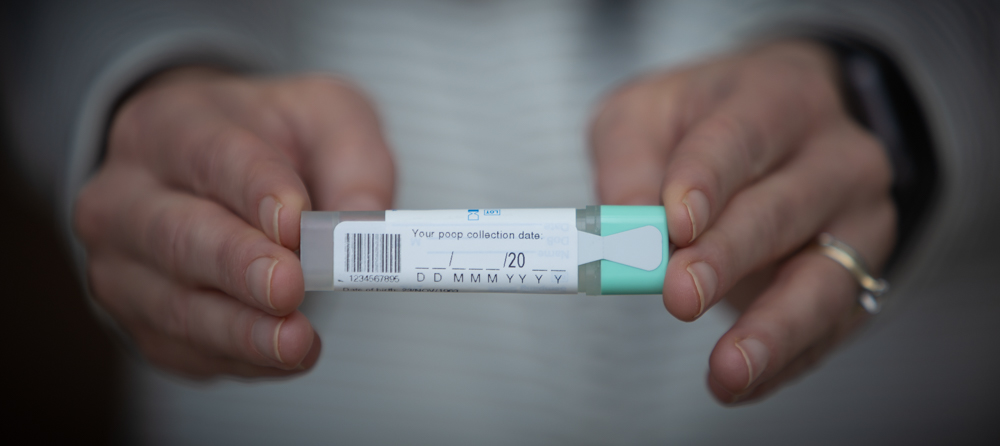
Poop, #2, BM, stool – whatever you call it, it could save your life.
If you’ve been putting off getting checked for colon cancer due to the COVID-19 pandemic, it’s time to put it back on your to-do list. Getting checked for colon cancer is quick, free and painless (really!). No need to make an appointment. No need to travel to the hospital. You can do the screening yourself, right from home.
Still on the fence?
Here are the top three reasons to get checked for colon cancer
- Early screening can save your life: When colon cancer is diagnosed early, it is more likely to be cured. Nine out of 10 people can be cured if colon cancer is caught early.
- You may have colon cancer and not know it: Colon cancer can have no symptoms, so getting screened can help you catch it early and improve your chances of survival.
- The screening is free and easy to do: The test used to screen people for colon cancer is free to use and can be delivered to your home. You can perform the test yourself and send the collection hassle-free by mail or drop it off at the lab.
Have more questions about colon cancer screening? Here are answers to some FAQs.
Who should get screened for colon cancer?
People ages 50 to 74 should get checked for colon cancer every two years, even if no one in their family has had the disease.
What test is used to screen for colon cancer
Ontarians use the fecal immunochemical test (FIT) test to screen for colon cancer. While the word “test” might sound daunting, the FIT test is quite the opposite. Here’s why:
- It’s free
- It’s mailed directly to your home
- It can be done at home
- It’s safe
- It’s painless
- It only takes a few minutes
- You don’t have to change your diet or medications
- Once you’re done, mail it away in a postage-paid envelope
How does the FIT test work?
The FIT test checks your stool (poop) for tiny amounts of blood, which can be caused by colorectal cancer or some pre-cancerous polyps (growths in the colon or rectum that can turn into cancer over time). Cancer Care Ontario will mail you a letter with your test result. Your family doctor or nurse practitioner will also get a copy of your test result from LifeLabs.
If my FIT test result is abnormal, do I have colon cancer?
If your test result is abnormal, it does not necessarily mean that you have colorectal cancer or polyps that could become cancer. It does mean that more testing is needed. ColonCancerCheck recommends that people with an abnormal result have a colonoscopy within eight weeks. Read more about an abnormal FIT result.
How can I get a FIT test?
Talk to your family doctor or nurse practitioner about receiving a free FIT test. If you don’t have a family doctor, you can call Telehealth Ontario at 1-866-828-9213 to have one mailed to you.
Learn more about screening for colorectal cancer from Cancer Care Ontario.
The Ottawa Hospital is a leader in colon cancer screening
Dr. Alaa Rostom, Chief of Gastroenterology at The Ottawa Hospital is the Regional Colorectal Screening/GI Endoscopy Lead for the Champlain Regional Cancer Program. Dr. Catherine Dubé is a gastroenterologist at The Ottawa Hospital and is the Clinical Lead for the ColonCancerCheck program for all of Ontario. These two dedicated physicians provide leadership, expertise and guidance at both the regional and provincial level.
The Ottawa Hospital is pleased to participate in ColonCancerCheck, Ontario’s colorectal cancer screening program, by providing colonoscopy services to those with an abnormal stool test result and those at increased risk of colon cancer.

Support patient care and research at
The Ottawa Hospital
You might also like…
Aging well: Guidance for older adults
In this special video series for both older adults and their loved ones, geriatric care specialists from The Ottawa Hospital offer guidance on navigating common health-care challenges that may arise with aging.
How to stay safe around water this summer
Drowning can happen to anyone — even strong swimmers. Emergency physician Dr. Christian Vaillancourt debunks common myths about drowning, explains how to act quickly to save a life, and shares what you can do to keep yourself and your loved ones safe around water.
What’s the difference between an optician, optometrist, orthoptist and ophthalmologist?
“Do I need to see an optician, optometrist, orthoptist or ophthalmologist?” We asked Ophthalmologist Dr. Annick Fournier to break down each role so you will know who to consult for your specific eye care needs.
Understanding rabies: Risks, vaccination and what to do after a bite
Although rare in Canada, rabies is almost always fatal once symptoms appear. Infectious diseases expert Dr. Michaeline McGuinty shares how rabies is spread, when to get vaccinated and what to do after a bite.
“My story doesn’t have to be your story”: New screening test better at preventing cervical cancer
“I went from being a 32-year-old new mom to a cancer patient with an incurable diagnosis.” Alicia’s journey underscores the critical role of HPV testing in preventing cervical cancer. Discover how the new HPV test can save lives and find out how to book your cervical screening appointment with our “Superscreener.”
Sign language interpretation services at The Ottawa Hospital: 5 FAQs
Do you require a sign language interpreter when you come to The Ottawa Hospital? For patients who are Deaf or hard of hearing, we provide both American Sign Language (ASL) and Langue des Signes Québécoise (LSQ) interpretation services at no cost. Before your next appointment with us, find out everything you need to know.


 To reset, hold the Ctrl key, then press 0.
To reset, hold the Ctrl key, then press 0.





